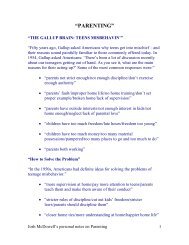Pdf Copy of Orthodoxy, by G.K. Chesterton - Christ United Methodist ...
Pdf Copy of Orthodoxy, by G.K. Chesterton - Christ United Methodist ...
Pdf Copy of Orthodoxy, by G.K. Chesterton - Christ United Methodist ...
Create successful ePaper yourself
Turn your PDF publications into a flip-book with our unique Google optimized e-Paper software.
9/ 27/ 12 The Pr oject G ut enber g eBook <strong>of</strong> O r t hodoxy, G . K. Chest er t on<br />
www. gut enber g. or g/ f iles/ 16769/ 16769- h/ 16769- h. ht m<br />
himself <strong>Christ</strong>. If we said what we felt, we should say, "So you are the Creator and<br />
Redeemer <strong>of</strong> the world: but what a small world it must be! What a little heaven you must<br />
inhabit, with angels no bigger than butterflies! How sad it must be to be God; and an<br />
inadequate God! Is there really no life fuller and no love more marvellous than yours; and is<br />
it really in your small and painful pity that all flesh must put its faith? How much happier you<br />
would be, how much more <strong>of</strong> you there would be, if the hammer <strong>of</strong> a higher God could<br />
smash your small cosmos, scattering the stars like spangles, and leave you in the open, free<br />
like other men to look up as well as down!"<br />
And it must be remembered that the most purely practical science does take this view <strong>of</strong><br />
mental evil; it does not seek to argue with it like a heresy, but simply to snap it like a spell.<br />
Neither modern science nor ancient religion believes in complete free thought. Theology<br />
rebukes certain thoughts <strong>by</strong> calling them blasphemous. Science rebukes certain thoughts <strong>by</strong><br />
calling them morbid. For example, some religious societies discouraged men more or less<br />
from thinking about sex. The new scientific society definitely discourages men from thinking<br />
about death; it is a fact, but it is considered a morbid fact. And in dealing with those whose<br />
morbidity has a touch <strong>of</strong> mania, modern science cares far less for pure logic than a dancing<br />
Dervish. In these cases it is not enough that the unhappy man should desire truth; he must<br />
desire health. Nothing can save him but a blind hunger for normality, like that <strong>of</strong> a beast. A<br />
man cannot think himself out <strong>of</strong> mental evil; for it is actually the organ <strong>of</strong> thought that has<br />
become diseased, ungovernable, and, as it were, independent. He can only be saved <strong>by</strong> will<br />
or faith. The moment his mere reason moves, it moves in the old circular rut; he will go<br />
round and round his logical circle, just as a man in a third-class carriage on the Inner Circle<br />
will go round and round the Inner Circle unless he performs the voluntary, vigorous, and<br />
mystical act <strong>of</strong> getting out at Gower Street. Decision is the whole business here; a door must<br />
be shut for ever. Every remedy is a desperate remedy. Every cure is a miraculous cure.<br />
Curing a madman is not arguing with a philosopher; it is casting out a devil. And however<br />
quietly doctors and psychologists may go to work in the matter, their attitude is pr<strong>of</strong>oundly<br />
intolerant—as intolerant as Bloody Mary. Their attitude is really this: that the man must stop<br />
thinking, if he is to go on living. Their counsel is one <strong>of</strong> intellectual amputation. If thy head<br />
<strong>of</strong>fend thee, cut it <strong>of</strong>f; for it is better, not merely to enter the Kingdom <strong>of</strong> Heaven as a child,<br />
but to enter it as an imbecile, rather than with your whole intellect to be cast into hell—or<br />
into Hanwell.<br />
Such is the madman <strong>of</strong> experience; he is commonly a reasoner, frequently a successful<br />
reasoner. Doubtless he could be vanquished in mere reason, and the case against him put<br />
logically. But it can be put much more precisely in more general and even æsthetic terms. He<br />
is in the clean and well-lit prison <strong>of</strong> one idea: he is sharpened to one painful point. He is<br />
without healthy hesitation and healthy complexity. Now, as I explain in the introduction, I<br />
have determined in these early chapters to give not so much a diagram <strong>of</strong> a doctrine as some<br />
pictures <strong>of</strong> a point <strong>of</strong> view. And I have described at length my vision <strong>of</strong> the maniac for this<br />
reason: that just as I am affected <strong>by</strong> the maniac, so I am affected <strong>by</strong> most modern thinkers.<br />
That unmistakable mood or note that I hear from Hanwell, I hear also from half the chairs <strong>of</strong><br />
science and seats <strong>of</strong> learning to-day; and most <strong>of</strong> the mad doctors are mad doctors in more<br />
senses than one. They all have exactly that combination we have noted: the combination <strong>of</strong><br />
an expansive and exhaustive reason with a contracted common sense. They are universal<br />
10/ 100





